21: Memory keepers
The history is gruesome, but delivered so delicately, and feels like receiving a gift
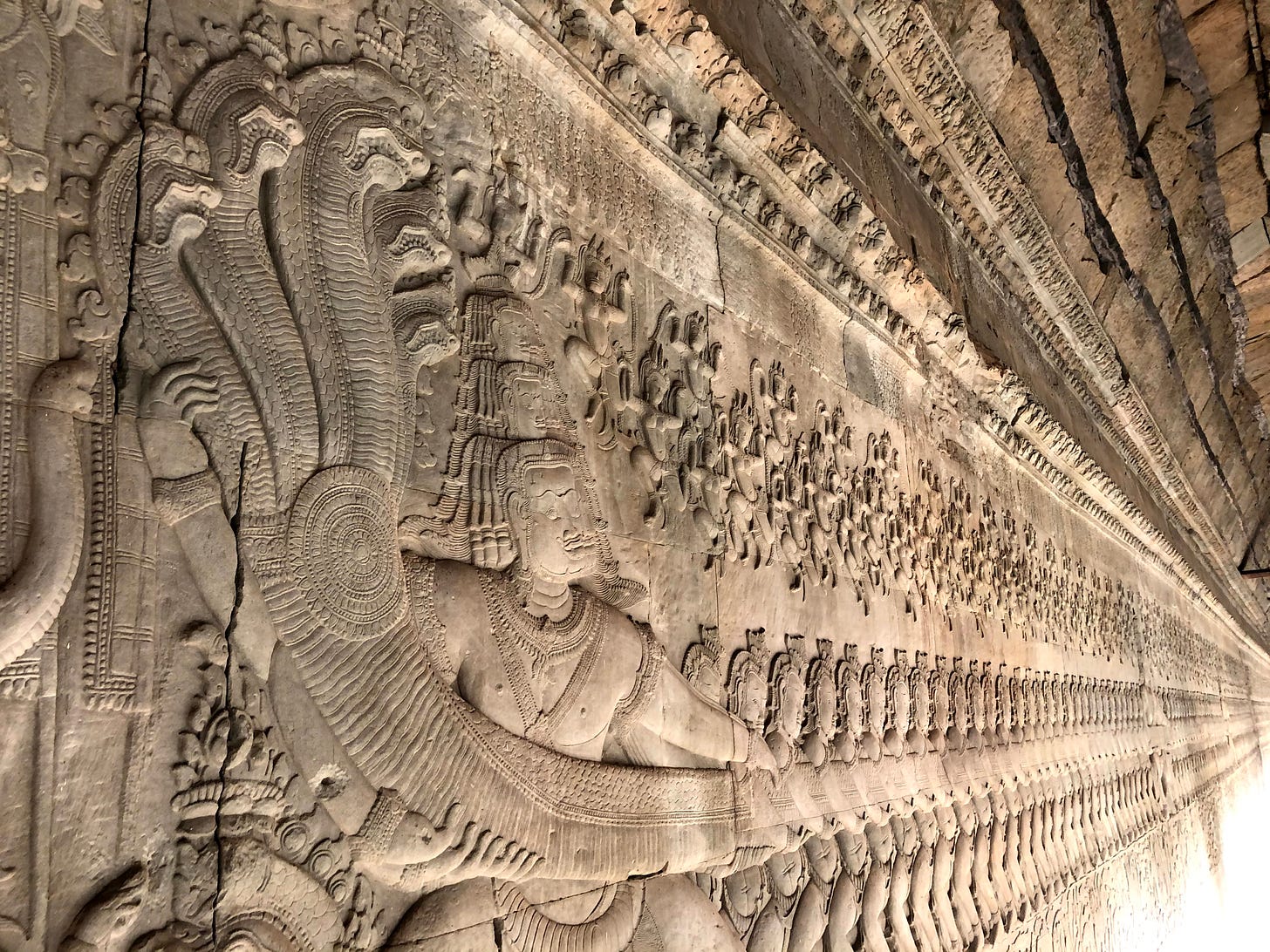
Naga, the seven-headed snake protector of Buddha, being carried around by like a million dudes. Angkor Wat.
So I recently got back from this trip to Cambodia and Laos, and briefly Bangkok, and it was an amazing trip but it’s the kind of thing that’s difficult to put into words. On one hand it’s this relatively frivolous thing, basically some Americans’ two-week vacation and there’s nothing worse than people going on about the precious wisdom gleaned from their time abroad. But travel is also profound in this really personal way that’s hard to even fully wrap your own head around. It kind of scrambles your brain.
And then on another level it’s just a bunch of random stuff that happened and now it’s over. It was riding rickety old bikes across an island of ginger and banana crops, drinking Negronis on a rooftop bar watching the sun set over Phnom Penh, riding in various boats down the Mekong, sleeping through a high fever waiting for 1500mg of antibiotics to do their job, sitting on the couch laughing and catching up with dear friends, eating noodles, swimming in infinity pools, wandering through night markets.
But I did want to bring something from the trip back to the old Crisis Palace, some souvenirs and a slide show, and in thinking about what to say I keep coming back to these two squishy themes of perspective and memory.

Lot of good sunsets. This one’s in Luang Prabang, Laos
Most of the work I do and things I think and write about tend to revolve pretty tightly around the United States and that makes some sense because this is my home after all and you can only really engage with so much it’s a big world. But spending time in a place so far outside of your usual realm, especially one like the US, you’re constantly having to face both how insignificant your one little country is in the grand scheme of things, but also how significant that one little country can be. The challenges facing other regions are so much different and bigger in their own way than the ones the United States faces, but also the way the United States deals with its problems can either create or alleviate profound problems far beyond its own borders.
I was talking to my therapist about this and he compared the US to a small spoiled child in a large family that nevertheless has the power to make everyone else miserable. And, of course, we frequently, directly harm other countries, something you are constantly reminded of in various historical plaques around the world.
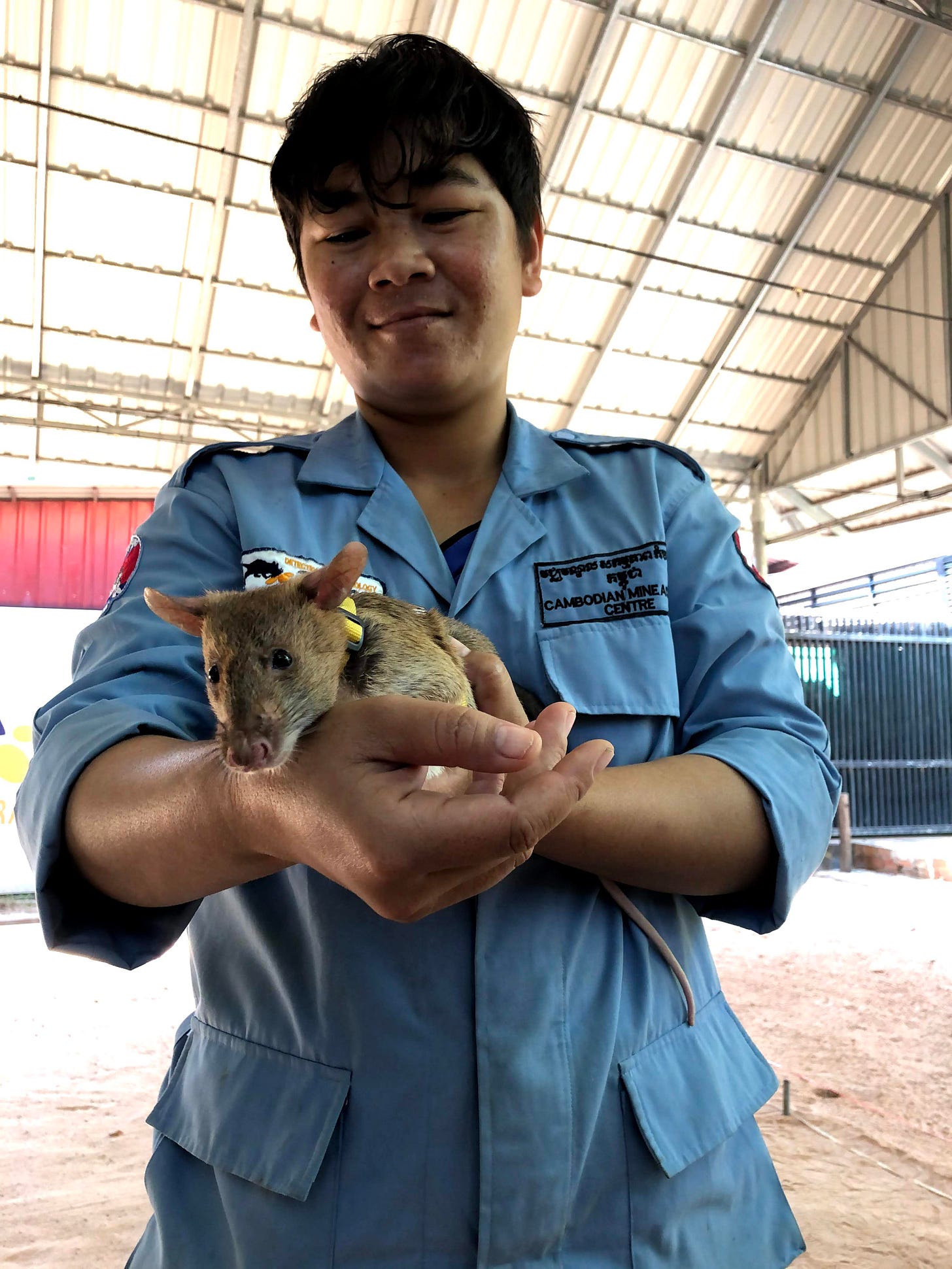
This rat named Bibititi and others like it can detect land mines and other explosives. The US dropped at least 26 million explosive sub-munitions on Cambodia during the Vietnam War.
Cambodia is like a lot of countries in the Global South and developing parts of Asia, in that it’s experiencing a lot of unequal economic growth, and with it growth in emissions, but still lacks sufficient investment to mitigate or adapt to climate change. It’s also dealing with a corrupt, albeit currently stable, government and threats to its economic sovereignty from outside superpowers. Meanwhile, whether it’s worsening drought, flooding, storms, or punishing heat, its people are suffering the consequences of the high standards of living that wealthier countries have been enjoying for many decades.
So it’s humbling to ride through swarms of diesel burning tuk tuks and scooters sometimes carrying families of four across town, or the endless chorus of construction in an urban center surrounded by rice farms, and then think about say public transit policy in Boston. It’s also infuriating and depressing to think about how much power and wealth we have in the States and think of what we could accomplish with it and what we actually accomplish with it. These aren’t super novel ideas or anything but seeing them up close for a couple of weeks is something, and it made me want to do a better job of understanding how issues I care about manifest in other parts of the world.
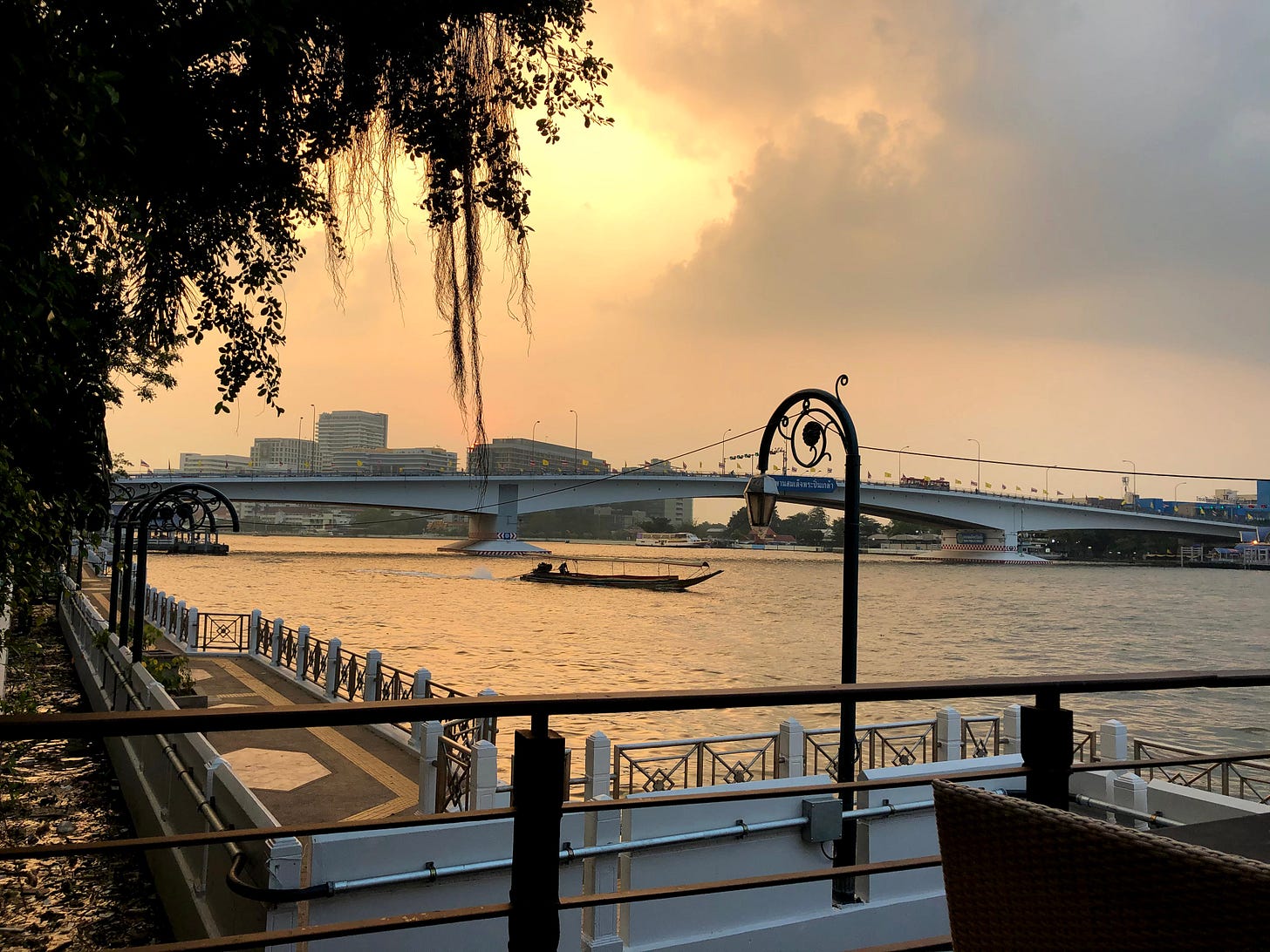
This one is Bangkok.
During the trip I was talking with a friend about climate change as is my bullshit and he was expressing pessimism that humanity will respond in some kind of noble or just way, you know judging by the scoreboard. But he is also fairly optimistic that we’ll make it through to the other side, because that’s just what people do. He was clear, however, that this is not a desirable outcome he is comforted by, that it basically means an “abandonment of any sense of ethics.”
That reminded me of this book by Annalee Newitz called Scatter, Adapt, and Remember, about how humanity has a good shot at avoiding extinction because we can do those three things in the title. But I couldn’t remember the third thing which is funny because it is literally to remember. And the remember part is probably the most important one. The scattering and adapting seems like something we are good at but the remember part, that is the tricky one.
One very important thing we did while in Phnom Penh was visit the Tuol Sleng Genocide Museum, which at one point was a school but was used as an interrogation and detention center during the Khmer Rouge regime. When Pol Pot’s forces seized control in 1975, the goal was to turn Cambodia into a classless, socialist agrarian society. That goal provided justification for dehumanizing and ultimately eliminating anyone with ties, perceived or real, to the preceding society. This is exemplified by the fact that when they took control of Phnom Penh, the Khmer Rouge declared it “Year Zero.” They were erasing the past. You could be executed for speaking a different language, even wearing glasses. The resulting genocide killed at least 1.7 million people, around a quarter of the population at the time, in just a few years.
The Tuol Sleng museum is incredibly well done. Walking the grounds, you get the feeling you are witnessing some of the worst cruelty humanity is capable of, but also that you are part of something sacred in the remembering of what happened here. Only 12 people survived the Tuol Sleng prison, and two of them still spend their days at the museum sharing their stories. The history is gruesome and painful to hear, but is delivered so delicately, and feels like receiving a gift. Visitors are asked to become “memory keepers” and “messengers of peace” upon leaving the site.
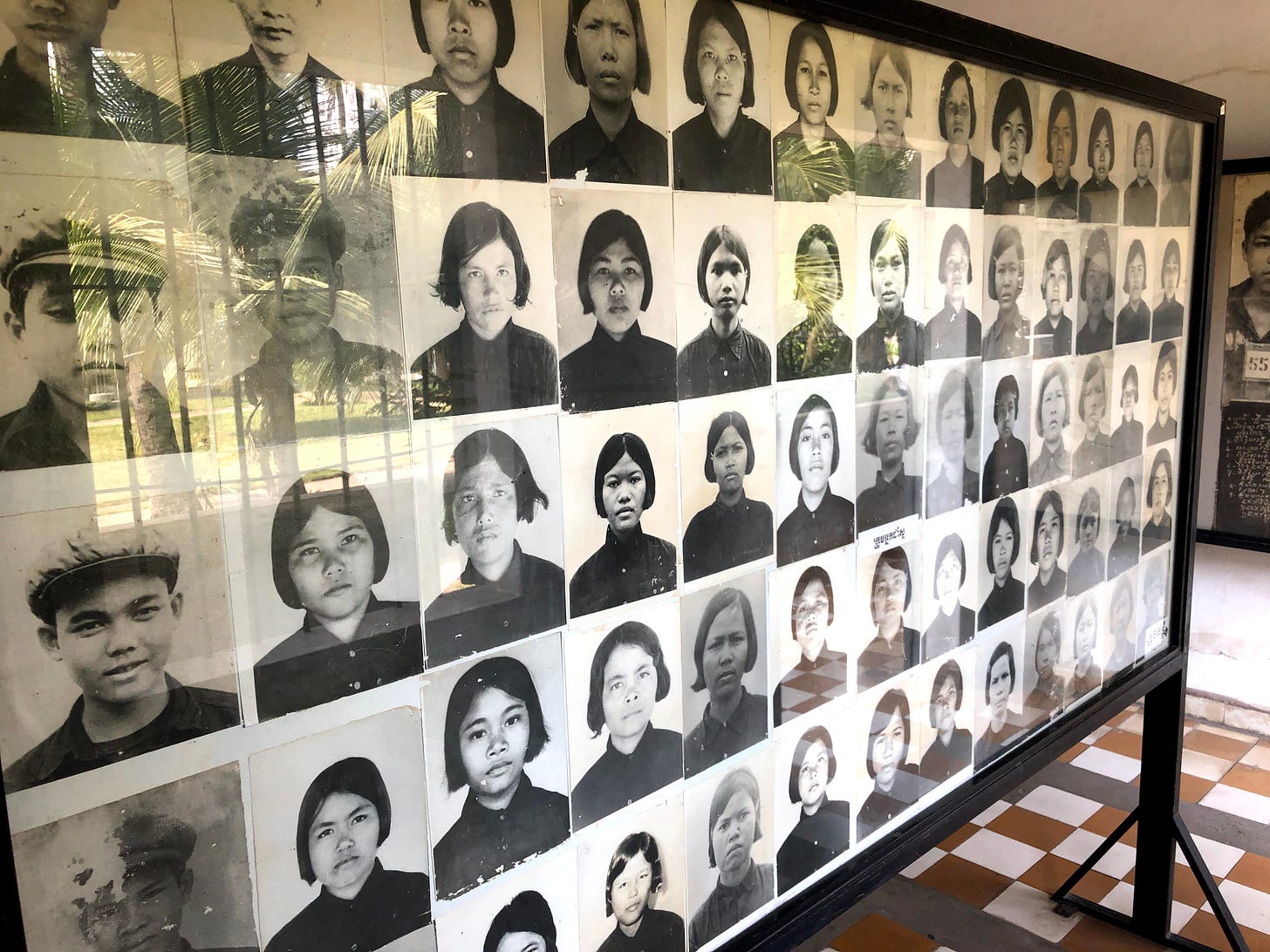
Photos of prisoners at the Khmer Rouge S-21 interrogation and detention center
I’ve mentioned before how Kate Marvel describes her biggest fear about climate change, that it’s not any geological outcomes, but “what it will make us do to each other.” Whether democracy can survive climate change, whether rapid change and scarcity of resources will only amplify our cruelty. There’s pushback coming from some climate circles that we should cool the talk about extinction and emergency, that humanity will survive. But what a low bar. Fear of extinction is about more than just loss of our species. It’s about loss of entire ways of life, entire cultures, the loss of our humanity in the name of mere survival.
In facing any big global crisis, not just climate change, I think my friend and Newitz are probably right that humanity will survive. We will certainly scatter and adapt. But I think whether we come out better on the other side requires that we stay rooted in our past and all we are capable of, good and bad, and always remember.

Links
Gov. Baker’s climate change goals are weak as hell.
On the other hand, California’s clean energy goals have state leaders looking to double (or more) the geothermal energy on the grid.
As risk of death from extreme heat increases, there are almost zero federal or state protections for workers.
Historically redlined communities of color are 5 degrees hotter on average, and as much as 12.8 degrees hotter in some cities (Portland and Denver have the worst disparities).
Number of million-dollar earners in Massachusetts is soaring.
Behind the scenes of Deadspin’s death by private equity firm.
How one Angeleno quit cars and improved her life.
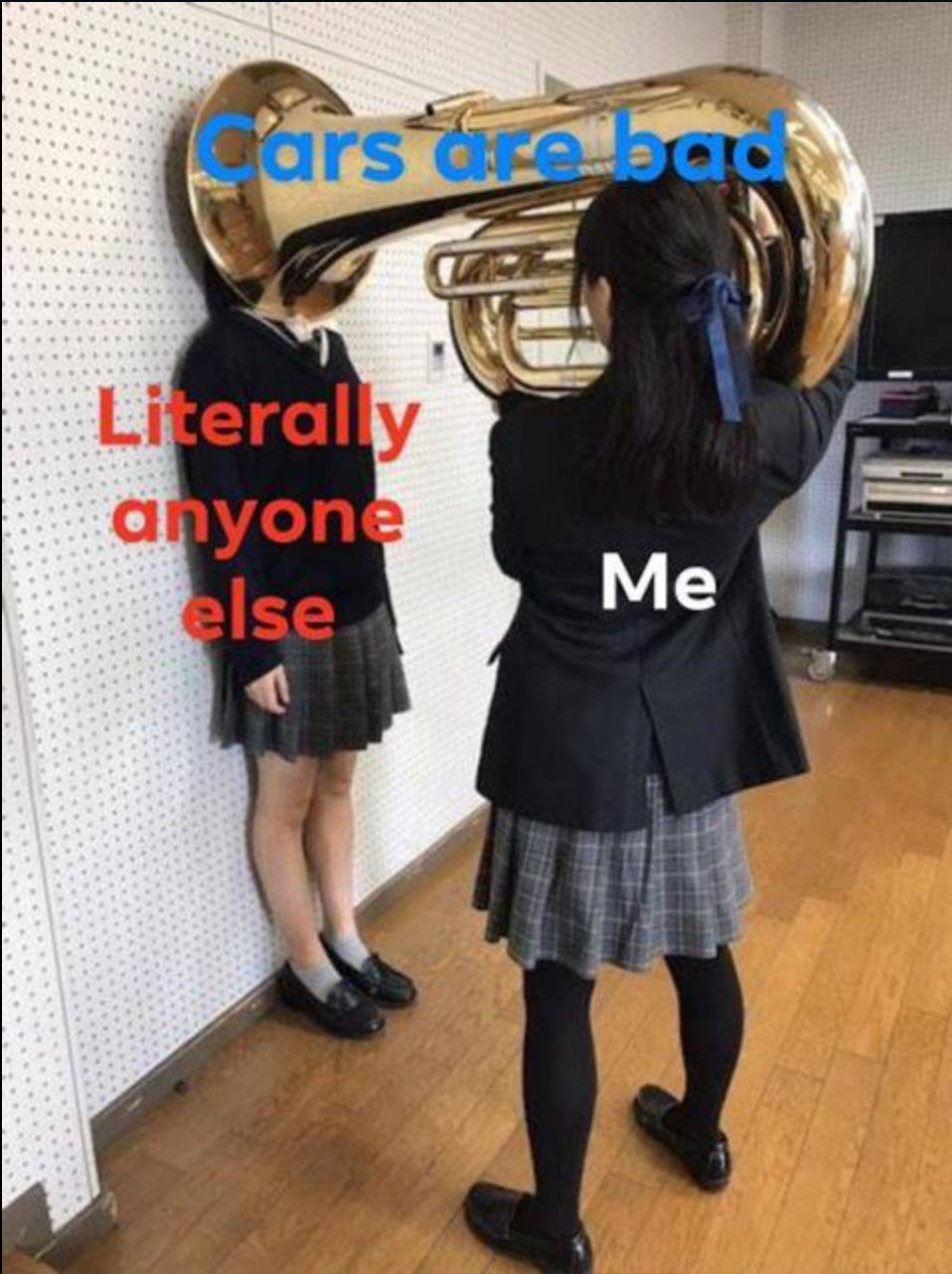
This is you when you get this newsletter.
Listening
Please enjoy this little firecracker from LA quartet Kills Birds, led with fury by Bosnian-Canadian filmmaker Nina Ljeti.
Reading
I have a lot of books to catch up on here but one I finished before leaving that I wanted to be sure to highlight is Shapes of Native Nonfiction, edited by Elissa Washuta and Theresa Warburton. I’m biased because Theresa is a very good friend and by law my family member but I would highly recommend it even if that were not the case. It’s an amazing collection of essays, and puts a unique focus on creative use of form and how it carries each author’s message. It’s a page-turner too, with an engaging mix of subject matter and plenty of humor.
Our hosts in Phnom Penh have two very smart and funny children and the first day we were there we had some time to kill with the kids. One thing I always try to teach young children whenever I have access to them is this funny little scatological rhyme and when I told the boy Simon I was going to teach him something illicit he got super serious and got a pen and paper so he could record it properly. Here it is.
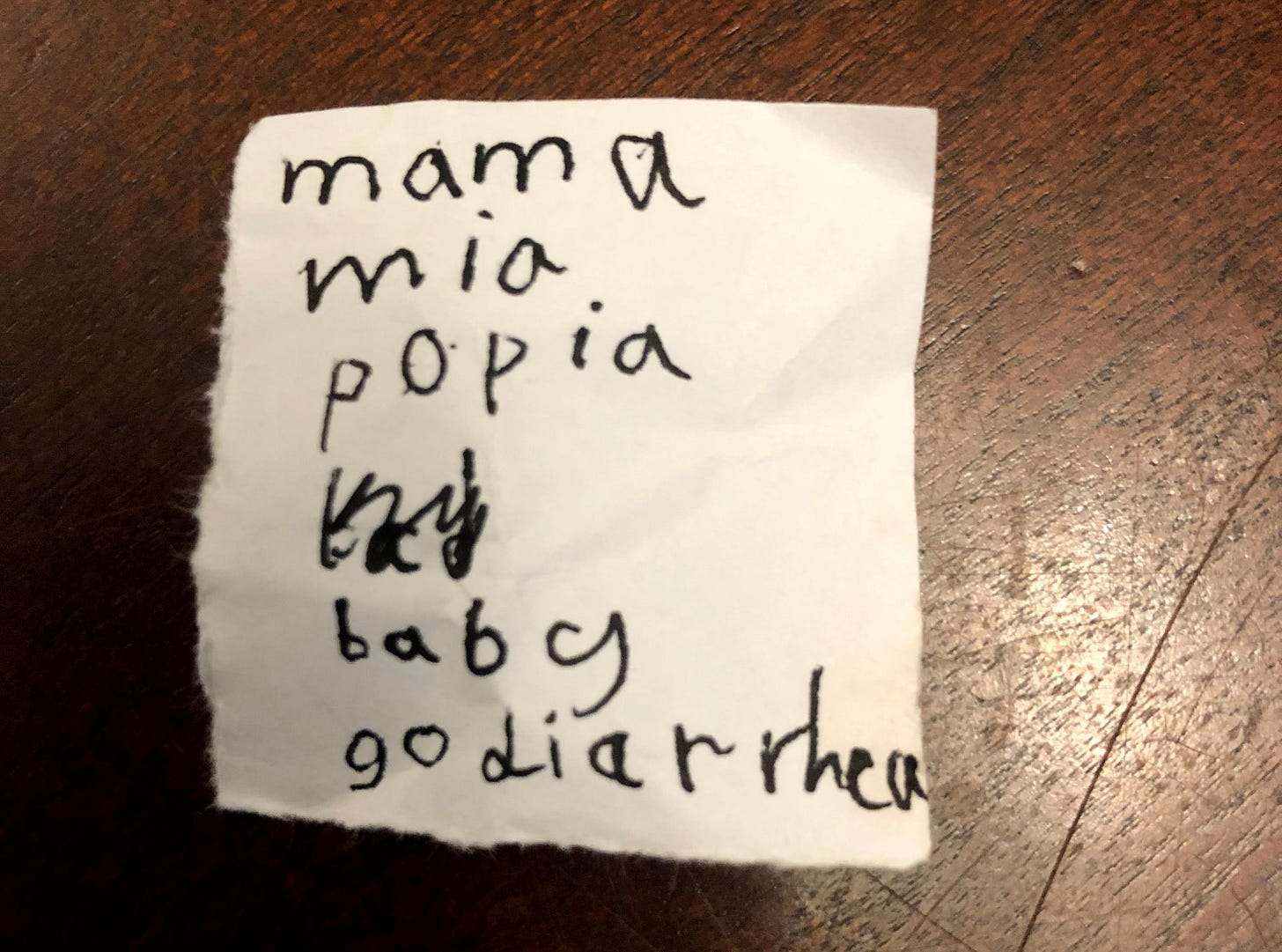
And with that my job is done.
Tate
